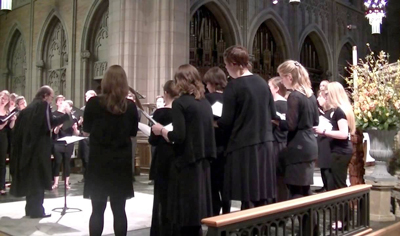by Mike Telin

The program, which explored aspects of Tudor music and its influences on the sacred choral repertoire of the 19th and early 20th centuries, began with William Byrd’s O Lord, make thy servant Elizabeth, the Queen. As they would throughout the performance, the ensemble sang with a pure, blended sound and dynamics ranging from whispered to full-bodied.
A reduced, un-conducted ensemble sang Robert Whyte’s Regina coeli with clear diction, while the full Collegium forces captured the essence of Byrd’s haunting motet Ne irascaris and its themes of the Babylonian captivity and desolation of Jerusalem.
The influences that Tudor music had on the later composers were brought to the fore during the pairing of poet/composer Thomas Campion’s Never weather-beaten sail from 1613 with C. Hubert H. Parry’s setting of the same poem from 1916.
Those influences were further highlighted during the “Kyrie” and “Agnus Dei” from Byrd’s Mass for Four Voices, which were followed by the same movements from Ralph Vaughan Williams’s 1922 Mass. Here the forty-voice ensemble produced a glorious sound befitting forces twice its size. A well-deserved shout-out to soprano Christine Jay, alto Linnea Scott, tenor David Boeckh, and bass Noel Warford for their fine quartet work during the Vaughan Williams.
Published on ClevelandClassical.com May 16, 2017.
Click here for a printable copy of this article


